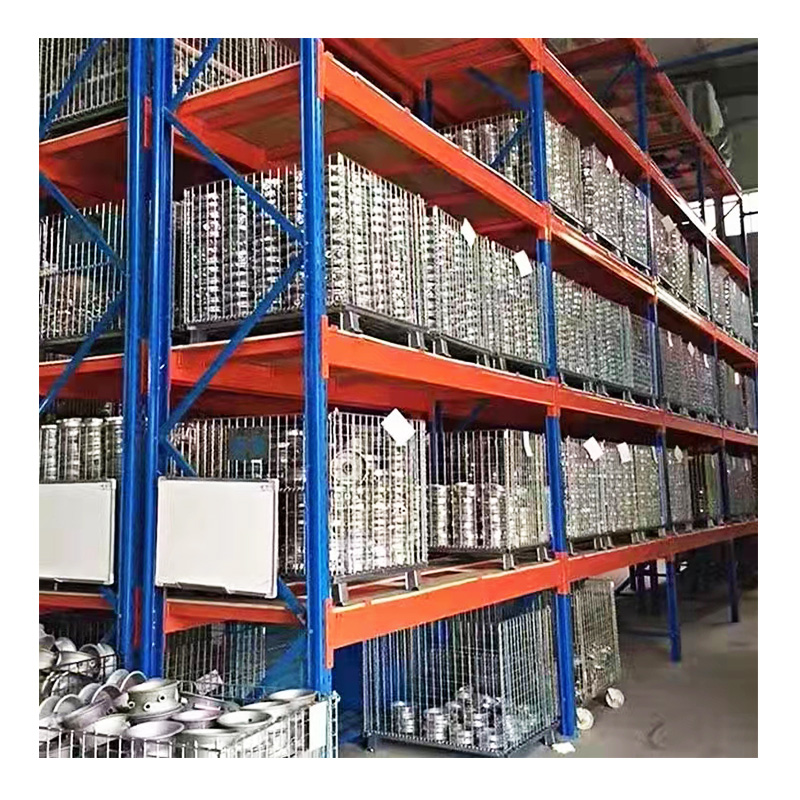What is heavy-duty shelving ?
Heavy-duty
shelves are the most commonly used shelves, each layer bearing more than 500kg,
and the name is derived from this. It has good picking efficiency and can store
heavier items, but the storage density is low. Heavy-duty racks are also called
Pallet Racks. They have the characteristics of heavy bearing capacity, wide
range of height adaptation, mechanical access, and high selection efficiency,
but the space utilization rate is general. Widely used in manufacturing,
third-party logistics and distribution centers and other fields, it is suitable
for both multi-variety and small-batch items, as well as small-variety and
large-volume items. Such shelves are most used in high-level warehouses and
ultra-high-level warehouses (most of the shelves in automated three-dimensional
warehouses use such shelves).
Why Heavy-duty shelves ?
1. Usually, the
goods are stored on the shelves after being assembled by pallets, storage cages
and other unit container equipment. The load of each unit is generally within
4000kg, and two units are usually placed on each floor.
3. It
has 100% random selection of goods. Handling machinery such as forklifts can
reach any cargo space for storage operations, and storage operations are
convenient and fast!
4. Use
mechanical handling equipment for storage operations.
5. The span of the unit shelf is generally
within 4m, the depth is within 1.5m, the height of the low and high warehouse
shelves is generally within 12m, and the height of the ultra-high warehouse
shelf is generally within 30m (such warehouses are basically automated
warehouses, and the total height of the shelves is determined by It is composed
of upright columns within 12m of several sections).
6. The height of each layer can be adjusted
freely by an integer multiple of 75mm.
Heavy Duty Shelves,Industrial Heavy Duty Shelves,Heavy Duty Pallet Rack,Heavy Duty Metal Shelves Wuxi Lerin Material Technology Co., Ltd. , https://www.lerin-tech.com
China News Agency, Changsha, December 16 (Reporter Liu Shuangshuang) Famous auto expert and the only academician of the Chinese Academy of Engineering, Guo Konghui, said at the 2005 China (Changsha) Automobile Summit held here today that he has become a world leader. The Chinese auto industry, which is the third-largest automobile sales country and the fourth-largest auto-producing country, must surpass the world level and must come from behind to achieve “five-selfâ€.
Independent opening, independent branding, independent development, independent innovation, and independent development are the “five-self†proposed by Academician Guo Konghui to break the bottleneck in the development of China’s auto work.
Academician Guo Konghui said that China’s auto industry has been developing for nearly 50 years. When Korea, which was more than a decade after China’s independent development, began to become a powerful automobile industry, China is still arguing over the need for “national brandsâ€.
How does China achieve the rise of the auto industry in the context of economic globalization? Guo Konghui believes that first of all, it needs to be both open and autonomous, that is, it is necessary to grow its own capabilities in openness to heal “dependent diseases,†and to develop its own capabilities, it is necessary to develop its own brand, to achieve independent development through independent brands, and then to create independent innovations. The core competitiveness of the company has been transformed from the “indigenization of assembly manufacturing†to the “development of localization†and “indigenization of knowledgeâ€, and it has finally entered the virtuous circle of autonomous development of the auto industry.
Guo Konghui believes that the production and sales volume of Chinese automobiles has grown from 1.06 million vehicles in the 1990s to 5.07 million vehicles in 2004. Chery, Geely and other national automobile companies are also growing quietly. It is entirely possible for China’s auto industry to come on top after the reform of the system and the adherence to the “Import and Digest Innovation†line. (Finish)
